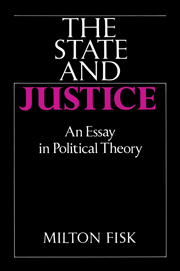Book contents
- Frontmatter
- Contents
- Preface
- Introduction: Can the state rule without justice?
- Part One An outline of a materialist political theory
- Part Two An assessment of the place of justice in the state
- Part Three A functional view of political institutions
- Part Four An account of the community of states
- Part Five A reflection on the transition to a new kind of state
- 21 Liberal egalitarianism
- 22 Revolutionary anarchism
- 23 Democracy and the transition to socialism
- 24 The socialist state
- Conclusion: State, class, and democracy
- Notes
- Index
22 - Revolutionary anarchism
Published online by Cambridge University Press: 06 July 2010
- Frontmatter
- Contents
- Preface
- Introduction: Can the state rule without justice?
- Part One An outline of a materialist political theory
- Part Two An assessment of the place of justice in the state
- Part Three A functional view of political institutions
- Part Four An account of the community of states
- Part Five A reflection on the transition to a new kind of state
- 21 Liberal egalitarianism
- 22 Revolutionary anarchism
- 23 Democracy and the transition to socialism
- 24 The socialist state
- Conclusion: State, class, and democracy
- Notes
- Index
Summary
For the anarchist, the state itself is an abomination; it deals unfairly with its subjects not by accident but unavoidably. A transformation based on an anarchist sense of radical justice is not one to an equalizing state or to a socialist state; it leads away from the state altogether. Once social democratic and communist states proved their potential for equaling the unfairness of earlier forms of the state, the anarchist logic was revived in the minds of many of those who felt a social transformation was needed. This logic underlies the thinking of those in the late 1960s and early 1970s who pressed the liberating force of what were called autonomous movements without considering it necessary for a state to integrate these movements. Is the state, in fact, so infected with its brutal past that a socialist state would be but one more abomination?
The anarchist's essentialist critique of the state
A commitment to liberty lies behind anarchist critiques of the state. In these critiques the state appears as an authority that crushes both individual and collective liberty. Since it conflicts with liberty, state authority cannot be fully legitimate. Anarchists might admit that liberty would be restricted to some degree, apart from the state, by society itself, which even in the best of cases needs repression for self-protection. Supposedly, though, the state goes beyond this by crushing liberty unnecessarily.
- Type
- Chapter
- Information
- The State and JusticeAn Essay in Political Theory, pp. 289 - 300Publisher: Cambridge University PressPrint publication year: 1989



